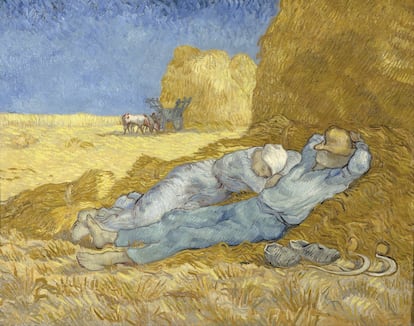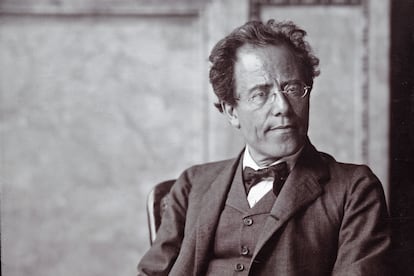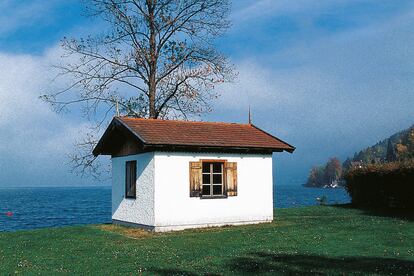Beyond Vivaldi's 'The Four Seasons': The composers who immortalized summer

" Summertime ," George Gershwin 's famous song that lulls us into a sweet summer slumber, is one of the best-known works of praise for summer. With it, the American composer began his most ambitious work: "Porgy and Bess ," an opera that took him 10 years to complete. Summer is present in many works by great composers, not just Vivaldi's well-known "The Four Seasons ." Masters such as Haydn, Beethoven, Berlioz, Tchaikovsky, Debussy, Mahler, Schumann, Mendelssohn, Handel, and Bach also cemented their connection with this season in different ways.
The arrival of summer has a transformative effect on our lives, on our habits and customs. Cities change. For example, Leipzig in Bach's time. Throughout the year, public concerts were held at the Café Zimmermann, offered by Bach as head of his Collegium Musicum. In winter, these were held on Friday evenings inside the establishment, run by Gottfried Zimmermann. But with the arrival of summer, the concerts were moved to Wednesdays at 4:00 p.m. in the café gardens. Thus, for years, the citizens of Leipzig were fortunate enough to be able to attend, while sipping a good cup of coffee and seated under the cool shade of linden and oak trees, concerts given by Bach himself, perhaps with one of his children and accompanied by students of the Collegium Musicum, in which works such as his concertos for two harpsichords, strings, and continuo were performed. Could there be a greater pleasure for the senses?

Summer was also an accomplice to one of the most talked-about concerts, never better said, given by the other German musical star, a contemporary of Bach: Georg Friedrich Haendel.
According to the conductor and musicologist Christopher Hogwood in his book dedicated to Handel (Alianza Música, 1988), a Prussian diplomat in London recounted the following: “A few weeks ago, the King expressed to Baron Kielmansegge his wish to hold a river concert.” Well, that river concert took place on the waters of the Thames on July 7, 1717, starting at eight in the evening. “Following the King's barge,” the chronicler continues, “was the musicians, about 50 in total, playing all kinds of instruments […] The music had been specially composed by the famous Handel, a native of Halle and Chief Court Composer to His Majesty.”

And so, on that summer night in 1717, Handel's Water Music , one of his masterpieces, was born. A concert of such impact would not be held again on the waters of London's river until June 7, 1977, when the irreverent punk group the Sex Pistols , who were banned from performing "on British soil," gave a concert from a boat on the Thames, coinciding with the 25th anniversary of the coronation of Queen Elizabeth II . The scandal was enormous and ended with injuries, an attempted boarding by the police, and several members of the group being taken to the police station.
But let's return to summer among the great composers. In 1876, the St. Petersburg magazine Nuvellist asked Pyotr Ilyich Tchaikovsky to write piano pieces to be published monthly for the duration of a year. It is said that, to remind him of this appointment, the Russian maestro asked his servant to give him a nudge each month to fulfill the request. It worked, and Tchaikovsky composed 12 pages compiled under the general title of The Seasons, Op. 37a. The three corresponding to summer have evocative names: June, barcarolle ; July, reaper's song; and August, the harvest.
Another Russian, Alexander Glazunov , also composed a ballet titled The Seasons . But Vivaldi's Four Seasons, Op. 8, is undoubtedly the most popular description of the passage of time over the course of a year. Vivaldi published these four violin concertos in Amsterdam in 1725, as part of his collection Il cimento dell'armonia e dell'invenzione . Each season is described not only with music, but also with poems attributed to the composer himself. Summer , in the key of G minor, speaks to us of the power of the sun that makes everyone languish, of the birdsong, of the shepherd, and the battle of the winds. The storm arrives and everything shudders until the calm and the clear, bright sky return.

The thunderstorm, a classic description of summer, reappears in Joseph Haydn 's The Seasons, Hob. XXI.3 , an oratorio composed after his time in England and a product of his admiration for Handel's oratorios. But the storm best described in a rural setting is undoubtedly Beethoven's Symphony No. 6 in F major, Op. 68 , Pastoral . Its fourth movement, Gewitter. Sturm (Lightning. Storm), masterfully describes the entire process of an impressive summer storm, from its first drops until it clears. Something we have all experienced at some point in the summer. The symphony concludes with the "Shepherds' Song, feelings of joy and gratitude after the storm."
Summer isn't just about relaxation. Farm work, harvesting, making hay bales, reaping the harvest, shearing the sheep... all of this became a familiar reference among writers, painters, and musicians. Robert Schumann included the piece " Reaper's Song" in his Album of Youth, Op. 68 , as Tchaikovsky did, evoking the month of July in his Seasons .
And, after the effort of work, or simply after a hearty meal, there's no summer without a siesta. Van Gogh 's painting of this title is absolutely descriptive. The warmth and sensual ardor of a siesta is captured in Claude Debussy 's Prelude to the Afternoon of a Faun , an artist who also takes us back to a common reference of the summer months: the sea. La mer is one of the most accomplished marine depictions and a masterpiece of the French genius.
“Summer makes its entrance. It is my third symphony. A huge smile to the whole wide world,” wrote Gustav Mahler in 1895. Because sometimes summer leads us to rest, but “to work,” as happened to Mahler. When his season as a conductor ended, he would retreat to a cabin facing a lake in the Austrian Alps, surrounded by forests, to devote himself to composition. Today, thanks to these summers, we can enjoy his symphonies and the Adagietto from his Symphony No. 5 , an evocative page of summer, love, and the search for beauty, transcribed by Thomas Mann in his novel Death in Venice and translated into cinematic language by Visconti. The scenes on the Lido beach remind us of those passionate summer loves, always fleeting or unattainable.
Today, it's worth immersing yourself in the beauty of these and other pieces by great composers, so evocative of the sweet, balmy days of summer.
EL PAÍS

%3Aformat(jpg)%3Aquality(99)%3Awatermark(f.elconfidencial.com%2Ffile%2Fbae%2Feea%2Ffde%2Fbaeeeafde1b3229287b0c008f7602058.png%2C0%2C275%2C1)%2Ff.elconfidencial.com%2Foriginal%2F065%2F112%2F228%2F0651122288ddcccd25820681db23f046.jpg&w=3840&q=100)


